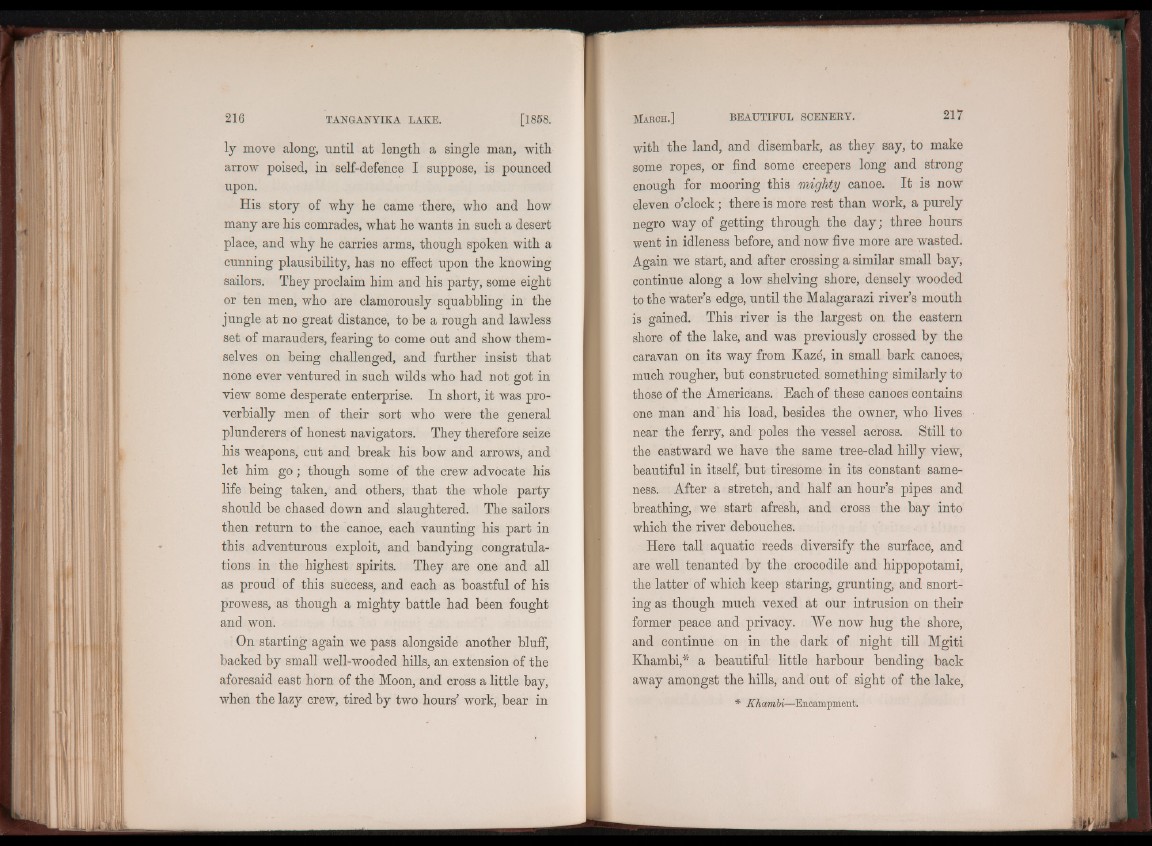
ly move along, until at length a single man, with
arrow poised, in self-defence I suppose, is pounced
upon.
His story of why he came there, who and how
many are his comrades, what he wants in such a desert
place, and why he carries arms, though spoken with a
cunning plausibility, has no effect upon the knowing
sailors. They proclaim him and his party, some eight
or ten men, who are clamorously squabbling in the
jungle at no great distance, to be a rough and lawless
set of marauders, fearing to come out and show themselves
on being challenged, and further insist that
none ever ventured in such wilds who had not got in
view some desperate enterprise. In short, it was proverbially
men of their sort who were the general
plunderers of honest navigators. They therefore seize
his weapons, cut and break his bow and arrows, and
let him g o ; though some of the crew advocate his
life being taken, and others, that the whole party
should be chased down and slaughtered. The sailors
then return to the canoe, each vaunting his part in
this adventurous exploit, and bandying congratulations
in the highest spirits. They are one and all
as proud of this success, and each as boastful of his
prowess, as though a mighty battle had been fought
and won.
On starting again we pass alongside another bluff,
backed by small well-wooded hills, an extension of the
aforesaid east horn of the Moon, and cross a little bay,
when the lazy crew, tired by two hours’ work, bear in
with the land, and disembark, as they say, to make
some ropes, or find some creepers long and strong
enough for mooring this mighty canoe. I t is now
eleven o’clock; there is more rest than work, a purely
negro way of getting through the day; three hours
went in idleness before, and now five more are wasted.
Again we start, and after crossing a similar small bay,
continue along a low shelving shore, densely wooded
to the water’s edge, until the Malagarazi river’s mouth
is gained. This river is the largest on the eastern
shore of the lake, and was previously crossed by the
caravan on its way from Kazd, in small bark canoes,
much rougher, but constructed something similarly to
those of the Americans. Each of these canoes contains
one man and' his load, besides the owner, who lives
near the ferry, and poles the vessel across. Still to
the eastward we have the same tree-clad hilly view,
beautiful in itself, but tiresome in its constant sameness.
After a stretch, and half an hour’s pipes and
breathing, we start afresh, and cross the bay into
which the river debouches.
Here tall aquatic reeds diversify the surface, and
are well tenanted by the crocodile and hippopotami,
the latter of which keep staring, grunting, and snorting
as though much vexed at our intrusion on their
former peace and privacy. We now hug the shore,
and continue on in the dark of night till Mgiti
Khambi,* a beautiful little harbour bending back
away amongst the hills, and out of sight of the lake,
* Khambi—Encampment.